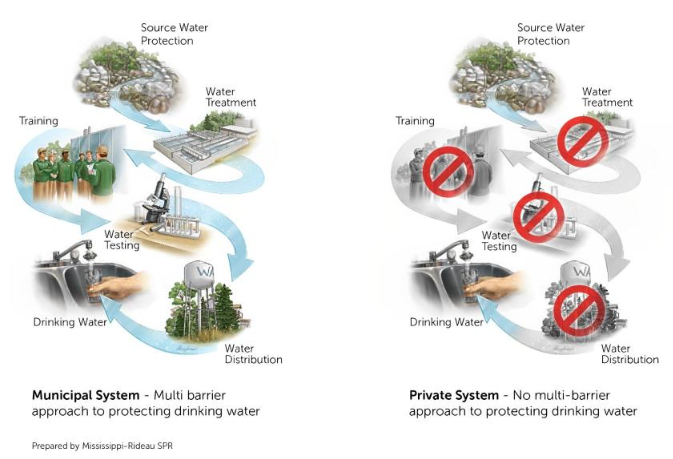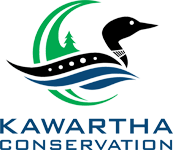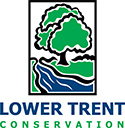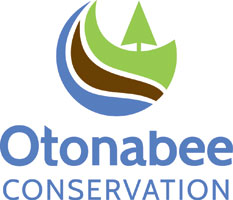Best Practices for Non-Municipal Drinking Water Systems
What are the Best Practices for Source Water Protection?
Do you drink water from a private well or intake? Then this section is for you. While Ontario’s Drinking Water Source Protection Program is generally focused on protecting municipal water sources, over 50% of the population within the Trent Conservation Coalition Source Protection Region is on private wells or drawing water from lakes, including most cottagers. A recent initiative launched in 2022 in conjuction with the Ministry of the Environment, Conservation and Parks is intended to extend the Best Practices learned from the Source Protection Program and regional Source Protection Plans, to owners of private systems, to increase local knowledge about the threats to their water sources, and what steps they can all take to protect them.
- The official webpage of the Best Practices guidance from the Ministry of the Environment, Conservation and Parks is available online here: https://www.ontario.ca/document/best-practices-source-water-protection
For a more indepth and engaging look at the Best Practices, we'd recommend the following storyboard walk-through of the guidance here, with helpful figures, images and quizes to best ensure your understanding. It contains information that can help cottagers, homeowners, small villages and rural schools that don’t have the luxury of safe municipal water.: Click here to view on a separate page.
In conjunction with this effort launched by the Ministry of the Environment, Conservation and Parks, the Trent Conservation Coalition Source Protection aims to recognize the vulnerabilities of private wells, surface water intakes, and non-municipal drinking water systems, and seek to educate, provide resources and raise awareness of the threats to those drinking water sources and ways to mitigate the threats.
Municipal vs Private Systems

- The success of the Municipal Drinking Water Source Protection Program is built on the multi-barrier approach. This diagram illustrates that approach to protecting municipal drinking water systems. As you can see, municipal systems have more resources compared to private system owners. When you own a non-municipal drinking water system, it is important to operate it responsibly and test it regularly. It's up to you to fill in those gaps and create your own multi-barrier approach.
The Ontario well records map is also a useful resource for seeing where wells are located near you: https://www.ontario.ca/page/map-well-records
Water Testing
- The best thing you can do to ensure your private drinking water system is providing safe drinking water is to regularly test your water.
- To view locations where you can pick-up and drop-off a home drinking water test kit, please visit: https://www.hkpr.on.ca/classes-clinics-and-supports/water-quality-and-testing/well-water-testing/
Drinking Water Wise Webinar Series
The Trent Conservation Coalition, Cataraqui, Rideau Valley, and Quinte Conservation have partnered to provide the Drinking Water Wise Webinar series. This is a FREE Microsoft Teams webinar series to help educate landowners and realtors on the importance of drinking water protection through monitoring and maintaining household systems. Each webinar will have a presentation about the Best Practices for Source Water Protection and a presentation from an expert in the field. All webinars will be recorded and available to view on Youtube afterwards. The webinar topics and schedule are as follows:
| Harmful Algal Blooms and Drinking Water | Link to Recording |
| Well Care 101 | Link to Recording |
| Septic Systems 101 | Link to Recording |
| Realty and Rural Source Water | Link to Recording |
| Rural Source Water and Human Health | Link to Summary Document |
|
Drinking Water Testing & Treatment |
Link to Recording |
| Groundwater 101 | Link to Recording |
| Harmful Algal Blooms: Science and Solutions | Link to Recording |
| Climate Change Impacts on Drinking Water & Boil Water Advisories | Link to Recording |
| Well Maintenance and Safety | Link to Recording |
Stay tuned for more webinar announcements into 2024. You can visit our registration page for more information about each Drinking Water Wise Webinar, or contact any of the staff involved:
-
Trent Bos
https://trentsourceprotection.on.ca/. Trent Conservation Coalition Source Water Protection
Kelsey Guerette
https://cleanwatercataraqui.ca/about-us/cataraqui-source-protection-area/. Cataraqui Conservation Source Water Protection
Natasha Mathieu
nmathieu@quinteconservation.ca
https://www.quinteconservation.ca/en/watershed-management/source-water-protection.aspx.
Marika Livingston
marika.livingston@mrsourcewater.ca
https://www.mrsourcewater.ca/en/. Mississippi-Rideau Source Water Protection





